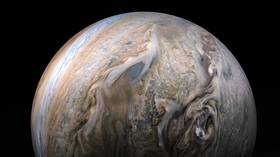'Totally breathtaking’: Meteor EXPLOSION on Jupiter captured in rare footage

A stargazer landed the shot of a lifetime on Wednesday after he captured extremely rare footage of a mysterious flash of light on Jupiter, which may have been an elusive meteor explosion.
Texas astrophotographer Ethan Chappel captured the incredible sight while he was filming the planet, and said the event on Jupiter’s southern equatorial belt “looks awfully like an impact flash.” A bright spot can be seen appearing out of nowhere before it quickly fades away.
Imaged Jupiter tonight. Looks awfully like an impact flash in the SEB. Happened on 2019-08-07 at 4:07 UTC. pic.twitter.com/KSis9RZrgP
— Chappel Astro (@ChappelAstro) August 7, 2019
“After I checked the video and saw the flash, my mind started racing! I urgently felt the need to share it with people who would find the results useful,” Chappel told ScienceAlert.
Astronomer Jonti Horner said he had “never seen anything like that before,” and described the flash as “just totally breathtaking.”
“A lot of the time these things will go unnoticed and unobserved,” he explained. “Half of them will happen on the far side of the planet. So there’s a lot of things working against seeing these events.”
Two views of #Jupiter early on 7 August 2019 with the flash I recorded. Left shows the moment of impact at 4:07 UTC. Right is an RGB image. pic.twitter.com/xPmS8MMFhc
— Chappel Astro (@ChappelAstro) August 8, 2019
The explosion appears to be a bolide, a meteor that explodes mid-air as it enters the atmosphere. They are fairly common on Earth, which is a smaller and less gravitationally intense a planet than Jupiter is. Jupiter is also surrounded by objects like comets and asteroids that can get sucked into its gravity.
A 1998 study found the rate of large impacts on Jupiter are between 2,000 and 8,000 times the rate of impacts on Earth. Capturing the impacts are rare, however. One was captured in 2009 and again in 2010.
The impact may have left a scar that could be picked up by the Jupiter probe Juno or other instruments.
Also on rt.com Earth’s future? Dead planets are sending out strange ZOMBIE SIGNALSThink your friends would be interested? Share this story!














